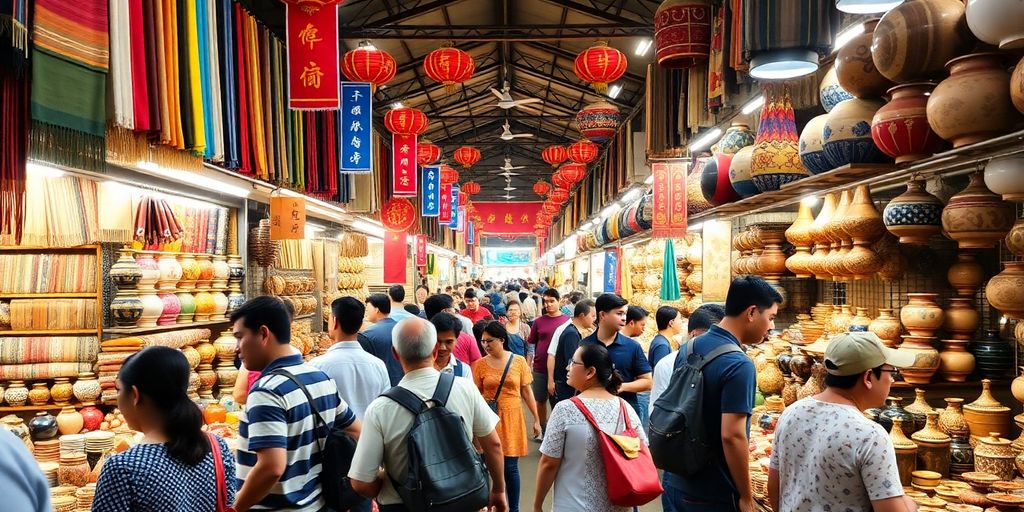So you’re thinking about diving into the wholesale market in China, huh? It’s a big step but can be super rewarding if you play your cards right. China’s market is massive, and there’s a lot to learn before you jump in. From picking the right suppliers to understanding how to communicate effectively, there’s a lot on the plate. Let’s break it down so you can get started on the right foot.
Kluczowe wnioski
- Research is your best friend. Get to know the market players and trends before making any moves.
- Finding reliable suppliers is crucial. Check backgrounds and build strong relationships.
- Cultural differences matter. Learn the etiquette and communication styles to work smoothly.
- Negotiation is an art. Understand pricing and avoid common pitfalls during discussions.
- Quality and compliance can’t be ignored. Work with inspectors to ensure standards are met.
Understanding the Wholesale China Market Landscape
Kluczowi gracze na rynku
The wholesale market in China is vast, featuring a variety of key players who each have a significant role. Producenci are at the heart of this ecosystem, producing a wide range of goods from electronics to textiles. Then, there are the trading companies that act as intermediaries, connecting buyers with manufacturers. Lastly, you have the wholesale markets, like those in Guangzhou, known for efficient product sourcing. These markets are bustling hubs where international buyers can find almost anything.
Trendy i dynamika rynku
China’s wholesale market is always changing, driven by trends like digitalization and sustainability. E-commerce platforms have made it easier for buyers to connect with suppliers, reducing the need for physical presence. Meanwhile, there’s a growing push towards sustainable practices, with more companies adopting eco-friendly production methods. Buyers need to stay alert to these trends to make informed purchasing decisions.
Środowisko regulacyjne
Navigating the regulatory environment in China can be tricky for international buyers. It’s essential to understand the import/export regulations, which can vary depending on the type of goods. China has strict standards, especially for products like electronics and toys, to ensure safety and quality. Buyers should also be aware of tariffs and trade agreements that may impact their costs and logistics.
Identifying Reliable Suppliers in China
Researching Supplier Backgrounds
Finding the right supplier in China can feel like searching for a needle in a haystack. But with some effort, you can make it less daunting. Start with some basic research on potential suppliers. Dive into their history, check their track record, and see if they’re legit. Online platforms can be a good starting point, but nothing beats attending trade shows or reaching out to sourcing companies that know the local scene. It’s like having a friend who knows the ropes, guiding you through the maze.
Ocena wiarygodności dostawcy
Once you’ve got a list of potential suppliers, it’s time to vet them. Look at their certifications and ask for references. It’s like checking reviews before buying a gadget online. You want to know if they deliver what they promise. Also, consider visiting their facility if possible. Seeing their operations firsthand can give you a clearer picture of their capabilities. Don’t just rely on what’s on paper; a personal visit can reveal a lot.
Building Long-term Relationships
In China, business is often about relationships. Building a strong connection with your supplier can lead to better deals and smoother transactions. Regular communication is key. Keep in touch, even when you’re not placing orders. It’s like maintaining a friendship; you don’t want to be that person who only calls when they need something. Over time, this relationship can be a significant asset, helping you navigate any hiccups that might come up.
Navigating Cultural Differences in Business
Zrozumienie chińskiej etykiety biznesowej
Doing business in China can be quite different from what you might be used to. Respect and hierarchy play a big role in Chinese business culture. It’s important to address people by their titles and surnames unless invited to do otherwise. When you meet someone for the first time, a light handshake is appropriate, and it’s customary to present and receive business cards with both hands. Make sure to take a moment to read the card before putting it away. This shows respect and interest.
Skuteczne strategie komunikacji
Communication in China often involves reading between the lines. Chinese communication emphasizes subtlety and indirectness, so it’s important to pay attention to non-verbal cues and implied meanings. Here are a few strategies to keep in mind:
- Listen More Than You Speak: Sometimes what’s not said is just as important as what is.
- Bądź cierpliwy: Discussions may take longer as decisions are often made collectively.
- Use Simple Language: Avoid slang and idioms that might not translate well.
Budowanie zaufania z chińskimi partnerami
Trust is the foundation of any successful business relationship in China. Building trust can take time, but it’s well worth the effort. Here are some tips:
- Bądź konsekwentny: Follow through on promises and commitments.
- Show Genuine Interest: Take time to learn about your partner’s business and culture.
- Engage in Social Activities: Business meals and social gatherings are common ways to build rapport.
Building a strong relationship with your Chinese partners requires patience and understanding. It’s not just about closing deals; it’s about creating a partnership that benefits everyone involved.
Negotiating Prices and Terms Effectively
Strategie skutecznych negocjacji
When you’re getting into negotiations with Chinese suppliers, it’s essential to have a plan. Start by understanding their perspective and what they value. Building a strong rapport can make a world of difference. Try to find common ground and be respectful of cultural differences. Sometimes, it’s not just about the numbers but also about the relationship.
- Odrób pracę domową: Know the market prices and trends.
- Jasno określ swoje potrzeby: Specify what you want in terms of quality and delivery.
- Practice patience: Negotiations can take time, so don’t rush.
Zrozumienie struktur cenowych
Pricing isn’t always straightforward. Suppliers might have different pricing for bulk orders, and there could be hidden costs. It’s crucial to ask the right questions and understand how they calculate their prices. Consider the following:
- Rabaty hurtowe: Often, buying in large quantities can reduce costs.
- Additional fees: Be aware of shipping, taxes, and any other fees.
- Wahania kursów walut: Exchange rates can impact your final cost.
Common Pitfalls to Avoid
Negotiating isn’t just about getting the best price; it’s also about avoiding common mistakes. Here are a few pitfalls to watch out for:
- Overlooking cultural nuances: Misunderstandings can occur if you’re not aware of cultural differences.
- Ignoring the fine print: Always read the contract thoroughly before signing.
- Being too aggressive: Pushy tactics can damage relationships and result in poor outcomes.
Negotiating with Chinese suppliers is more than just a transaction; it’s about building a partnership that benefits both parties. Patience, understanding, and respect can lead to successful deals.
For more insights on effective negotiation with Chinese suppliers, consider Budowanie silnych relacji as a key strategy.
Zapewnienie jakości i zgodności produktu
Środki kontroli jakości
When buying wholesale from China, keeping an eye on quality is a must. Requesting samples before you place a big order is a smart move. This way, you can check the product yourself and make sure it meets your standards. Another good idea is to use third-party inspection services. They can help verify that the goods are up to scratch before they get shipped. Here’s what you can do:
- Order Samples: Always get a sample first to see the product quality firsthand.
- Hire Inspectors: Consider third-party inspectors to check the products before they leave the factory.
- Ustal jasne standardy: Make sure your quality expectations are clear and agreed upon with the supplier.
Zrozumienie wymogów zgodności
Compliance can be a tricky part of buying from China, but it’s important. Different countries have different rules about what can be imported, so you need to know what applies to your situation. This might include things like safety standards, labeling requirements, and more. Ignoring these can lead to delays or even fines, so it’s better to be safe than sorry.
Working with Third-party Inspectors
Third-party inspectors are like your eyes and ears on the ground in China. They can visit the factory, check the production process, and make sure everything is up to par. This can save you a lot of headaches later on. Plus, it adds an extra layer of confidence that what you’re getting is what you expect.
Quality control and compliance are not just about avoiding problems; they’re about building a reputation for reliability and trustworthiness in your business dealings.
Managing Logistics and Shipping from China
Wybór właściwej metody wysyłki
Picking the right shipping method is like choosing the right tool for a job. You want something that fits your needs perfectly. Sea freight is great for large shipments, though it takes longer. Air freight is faster but costs more. Express couriers are super quick and convenient, but they can be pricey too. Think about what you’re shipping, how fast you need it, and, of course, your budget.
Zrozumienie procedur celnych
Customs can be a real headache if you’re not prepared. You need to know what documents are required, like commercial invoices and packing lists. It’s also smart to have someone who understands the process, maybe a customs broker. They can help you avoid delays and fines. Remember, each country has different rules, so do your homework.
Dealing with Shipping Delays
Shipping delays happen, and they’re frustrating. Weather, port congestion, or customs issues can all slow things down. It’s important to have a backup plan. Keep in touch with your shipping provider and customers. Let them know what’s happening and when they can expect their goods. Sometimes, it’s about managing expectations as much as managing logistics.
Shipping from China can be complex, but with the right strategies, it becomes manageable. Always plan ahead and stay informed to keep things running smoothly.
Wykorzystanie technologii do efektywnego pozyskiwania zasobów
Using Online Platforms for Sourcing
Online platforms have revolutionized how international buyers source products from China. Alibaba’s AI assistant, for instance, is a game-changer for merchants, making online sourcing smoother and boosting their global trade abilities. These platforms offer a vast array of suppliers and products, allowing buyers to compare prices, quality, and reviews all in one place. This digital shift not only saves time but also opens up opportunities to connect with suppliers that might have been hard to find otherwise.
Implementing Supply Chain Management Software
Managing a supply chain can be a headache, but with the right software, it becomes a lot more manageable. Supply chain management (SCM) software helps in tracking inventory, managing orders, and optimizing logistics. Here’s a simple breakdown of what SCM software can do:
- Inventory Tracking: Keep tabs on stock levels in real-time.
- Order Management: Streamline the processing of orders from start to finish.
- Logistics Optimization: Enhance shipping routes and reduce delivery times.
This tech not only cuts down on errors but also boosts efficiency, making sure everything runs like a well-oiled machine.
Staying Updated with Technological Trends
Technology is always changing, and keeping up with the latest trends is key to staying competitive. Whether it’s adopting AI tools or exploring blockchain for transparency, being in the loop with tech trends can give you an edge. Make it a habit to:
- Attend Webinars: Join online sessions to learn about new tech developments.
- Read Industry Blogs: Follow tech blogs to stay informed on the latest innovations.
- Network with Peers: Connect with others in the industry to share insights and experiences.
Embracing technology in sourcing isn’t just about keeping up; it’s about staying ahead. By integrating these tools and trends, international buyers can streamline their processes and build stronger partnerships with Chinese suppliers.
Understanding Payment Methods and Risks

Common Payment Methods in China
When dealing with suppliers in China, it’s important to know the different ways you can pay. Here are some of the most common methods:
- International Wire Transfers: This is a straightforward way to send money abroad. It’s widely accepted but can sometimes be slow and expensive.
- Letters of Credit: These provide a safety net for both buyers and sellers. They ensure that payment is only made when certain conditions are met.
- Usługi Escrow: This method holds the payment until both parties are satisfied with the transaction. It’s a great way to minimize risk.
For a more detailed look at these methods, including Wise Business, you can explore various options tailored to your needs.
Ograniczanie ryzyka finansowego
Navigating payments involves understanding the risks involved. Here’s how you can protect yourself:
- Weryfikacja poświadczeń dostawcy: Always check the background of your supplier. This helps prevent fraud and ensures you’re dealing with a legitimate business.
- Bezpieczne metody płatności: Opt for methods that offer protection, like escrow services, to safeguard your funds.
- Set Clear Payment Terms: Before making any payments, agree on terms that are clear to both parties. This can prevent misunderstandings later.
Remember, taking the time to verify and secure your transactions can save you from potential headaches down the line.
Securing Transactions
Securing your transactions is key to a successful business relationship. Here’s what you can do:
- Use Two-Factor Authentication: This adds an extra layer of security to your transactions, making it harder for unauthorized access.
- Regularly Monitor Transactions: Keep an eye on your accounts to spot any unusual activity quickly.
- Educate Your Team: Make sure everyone involved in the transaction process knows the importance of security and how to maintain it.
By following these steps, you can reduce the risk of financial loss and build trust with your Chinese partners.
Adapting to Market Changes and Challenges

Staying Informed About Market Changes
In the fast-paced world of global trade, staying updated is not just an option—it’s a necessity. Keeping an eye on market trends and shifts can make or break your business strategy. Whether it’s through industry reports, trade journals, or attending key conferences like China and the Changing Global Trade Landscape, staying informed helps you anticipate changes and prepare accordingly.
Adapting to Economic Fluctuations
Economic ups and downs are part of the game. To navigate these fluctuations, businesses need to be agile and ready to pivot. Here are some steps to consider:
- Diversify your supplier base to reduce dependency on a single source.
- Build a financial cushion to weather unforeseen downturns.
- Regularly review and adjust pricing strategies to remain competitive.
Overcoming Common Challenges
Every market presents its own set of challenges. In China, international buyers often face issues like regulatory changes or communication barriers. Here’s how to tackle these:
- Establish a reliable local presence or partner to handle on-the-ground issues.
- Invest in language and cultural training for your team.
- Stay flexible and open to adjusting your business practices to align with local norms.
"Being prepared for market changes is like having an umbrella on a cloudy day—you might not need it, but you’ll be glad you have it if it starts to rain."
Building a Sustainable Business Model
Incorporating Sustainability Practices
Creating a sustainable business model isn’t just a trend—it’s a necessity in today’s world. Companies need to think about how they can reduce their environmental impact while still making a profit. Here are a few ways to incorporate sustainability into your business:
- Assess your supply chain: Look at every step of your supply chain and find ways to make it more eco-friendly. This might mean choosing suppliers who use sustainable materials or finding ways to reduce waste.
- Reduce energy consumption: Implement energy-saving measures in your operations. This could be as simple as switching to LED lighting or as complex as investing in renewable energy sources.
- Promote recycling and reuse: Encourage recycling in your workplace and find ways to reuse materials. This not only helps the environment but can also save money.
Building a sustainable business doesn’t happen overnight. It’s about making small, consistent changes that add up over time.
Long-term Planning and Strategy
Thinking long-term is key to sustainability. Businesses need to plan for the future, not just the next quarter. Here are some strategies to consider:
- Set clear sustainability goals: Define what sustainability means for your business and set achievable goals.
- Invest in technology: Use technology to track your progress and identify areas for improvement. This can help you stay on track and make informed decisions.
- Engage with stakeholders: Get input from employees, customers, and other stakeholders. Their insights can be invaluable in shaping your strategy.
Równoważenie kosztów i jakości
One of the biggest challenges in building a sustainable business model is balancing cost and quality. It’s important to find ways to keep costs down without sacrificing quality. Here are some tips:
- Look for cost-effective solutions: Sometimes, the most sustainable option is also the most cost-effective. For example, using energy-efficient equipment can save money in the long run.
- Prioritize quality over quantity: Focus on delivering high-quality products and services, even if it means producing less. This can lead to greater customer satisfaction and loyalty.
- Continuously evaluate your processes: Regularly review your processes to identify areas for improvement. This can help you find new ways to reduce costs and improve quality.
Więcej informacji na temat creating sustainable supply chains, consider exploring reports that offer guidance in this complex and dynamic business landscape.
Legal Considerations for International Buyers
Understanding Contract Law in China
Navigating through China’s legal system can feel like trying to solve a complex puzzle. It’s a web of national laws, local rules, and court interpretations that can change how laws are applied. For international buyers, understanding the basics of contract law is essential. Contracts in China need to be clear and detailed. Make sure everything you agree on is written down. It’s not just about trust; it’s about having a solid legal foundation.
- Always have bilingual contracts.
- Specify terms clearly, including payment schedules and delivery timelines.
- Ensure both parties sign and seal the contract.
Ochrona własności intelektualnej
When doing business in China, protecting your intellectual property (IP) should be a top priority. China has made strides in IP protection, but it’s still a challenging area. Register your trademarks and patents in China, not just in your home country. This step is crucial because without local registration, your IP isn’t protected under Chinese law. Consider:
- Registering your IP early.
- Using non-disclosure agreements (NDAs) with partners and suppliers.
- Monitoring the market for potential infringements.
Navigating Dispute Resolution
Disputes can happen, even with the best planning. When they do, knowing how to handle them is key. China offers several ways to resolve disputes, including mediation, arbitration, and litigation. Arbitration is often preferred because it’s usually faster and the decisions are easier to enforce internationally. Keep these points in mind:
- Choose arbitration over litigation for international disputes.
- Include a dispute resolution clause in your contracts.
- Select a neutral arbitration center.
Handling legal issues in China might seem daunting, but with the right preparation and understanding, it becomes manageable. Remember, it’s all about being proactive and protecting your interests from the start.
If you’re an international buyer, it’s important to understand the legal rules that come with your purchases. These rules can vary greatly from one country to another, affecting everything from taxes to shipping. To make sure you’re on the right track, visit our website for more information and guidance on navigating these legal waters. Your success in international trade starts with being informed!
Podsumowanie
So, there you have it. Buying from the wholesale market in China isn’t as scary as it might seem at first. Sure, it takes some time to get the hang of it, but once you do, it can really pay off. Just remember to do your homework, ask lots of questions, and don’t rush into anything. It’s all about finding the right balance between quality and price. And hey, if you mess up, it’s not the end of the world. Learn from it and try again. The market’s always changing, so stay flexible and keep an open mind. Happy shopping!
Często zadawane pytania
What is the wholesale market like in China?
The wholesale market in China is huge and has many different players. It’s a place where you can find almost anything you need, from clothes to electronics. The market changes quickly, so it’s important to keep up with the latest trends.
Jak mogę znaleźć godnych zaufania dostawców w Chinach?
To find reliable suppliers, you should research their background and check reviews from other buyers. It’s also helpful to visit their factories if you can, or at least have video calls to see how they operate.
What should I know about Chinese business culture?
Chinese business culture values respect and relationships. It’s important to be polite and patient, and to understand their business customs. Building trust takes time, so be prepared to invest in long-term relationships.
How do I negotiate prices with Chinese suppliers?
When negotiating prices, it’s important to know the market rates and be clear about your needs. Don’t be afraid to ask for discounts, but also be willing to compromise. Being respectful and understanding can lead to better deals.
How can I make sure the products meet quality standards?
To ensure product quality, you can set clear standards and do regular checks. Working with third-party inspectors can also help you verify that the products meet your expectations and any necessary regulations.
What are the best ways to handle shipping from China?
Choosing the right shipping method depends on your needs and budget. It’s important to understand customs procedures and be prepared for possible delays. Planning ahead can help you avoid problems.
What payment methods are safe when dealing with Chinese suppliers?
Common payment methods include bank transfers and using platforms like PayPal. To reduce risks, it’s best to use secure payment methods and have clear agreements with your suppliers.
How do I stay updated with changes in the China market?
Staying informed about market changes means keeping an eye on news and trends. Joining trade groups and attending industry events can also help you learn about new opportunities and challenges.





